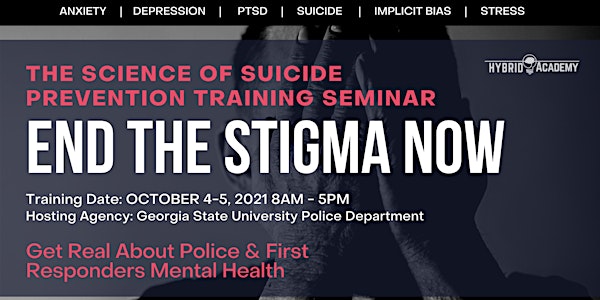
The Science of Suicide Prevention and Mental Resilience Training
Training Approved by the Georgia Peace Officers Standards and Training Council (P.O.S.T)
Location
Georgia State University, Perimeter College Clarkston Campus Parking Lot 3
3735 Memorial College Avenue Clarkston, GA 30021Refund Policy
About this event
THE SCIENCE OF SUICIDE PREVENTION AND MENTAL RESILIENCE TRAINING
October 4, 2021, Monday: 8am-5pm
October 5, 2021, Tuesday: 8am-5pm
_____________________________
Hosting Agency: Georgia State University Police Department
Course Number: NCC01G
Hours: 16 (Two-Day Course)
Location: Georgia State University
- 3735 Memorial College Avenue, Clarkston, GA 30021, Perimeter College Clarkston Campus, Parking Lot 3
Lead Instructor’s Name POC: Margret Younis
Course Target Population: Law Enforcement, First Responders
Register by August 15, 2021
and save up to 20% on each registration!
Early-bird pricing: $199
After August 15, 2021: $249
COURSE HIGHLIGHTS:
This course is designed to provide officers with an understanding of the psychology of suicide, fear, stress, emotions, thoughts, and behaviors that result from critical incidents or traumatic events, and utilize such knowledge to provide effective behavioral interventions that can mitigate the potential psychological impact that these events can have on officers.
This course is designed as a proactive approach to suicide prevention. The skills and resources taught during this course may help save the life of an officer. The course provides the cognitive and behavioral tools necessary to sustain an officer’s mental health, build emotional resilience, and reduce the risk of suicide before a crisis point.
The purpose of this course is to sharpen your officers' awareness of their own self and teach them how to utilize their own psychological functions to decrease anxiety, lower the effects of stress, identify errors in their own thoughts and behaviors, and course correct the way they think, feel, and behave.
The course introduces officers to specific functions and the architectural design of the human brain. Officers will learn how different parts of the brain are responsible for trauma processing, emotions, stress, fear, anxiety, and PTSD. It will provide an understanding of the importance of knowing the correlation between biological activities and psychological events, and how this correlation affects decision making, emotions, and behavior.
____________________________
At the end of our course officers will be able to:
- Define the concepts of trauma and mental health crises as they pertain to law enforcement officers.
- Define the concept of stigma.
- Promote the attitude that suicide prevention is the responsibility of every officer in the department.
- Define the concept of suicidal ideation and identify its consequences.
- Identify risky behaviors and implement protective factors to prevent suicidal ideation in the self and others.
- Analyze their emotions and the quality of their own thinking patterns, and course correct them before a crisis point.
- Utilize knowledge of neurological, biological, and psychological functions to identify thinking errors in themselves and others, and course correct them accordingly.
- Gain a better understanding of mental processes applicable to law enforcement officers, and demonstrate an understanding of the correlations between the brain and the mind, the mind and behavior, and thinking processes and emotions.
- Recognize thinking patterns and behaviors in themselves and others that indicate an increased risk of depression.
- List the consequences of suicide for fellow officers, family, and society.
- Understand the mechanism of the fight or flight response and its associations with aggression, anxiety, excessive force, and decision making processes.
- Implement threat analysis and behavioral interventions to control fear and promote resilience.
- Apply psychological strategies and skills to their own unique situations and take an active role in self-recovery.
- Employ psychological strategies designed to decrease anxiety, stress, and negative thinking patterns.
- Replace uncertainty in their own behavior with a strategic approach to self-development.
- Explain the causes of PTSD and recognize symptoms and behaviors of an officer experiencing PTSD.
- Analyze behavior without bias and think strategically to implement solutions.
- Demonstrate an awareness of cognitive distortions and biases that impact perspective and influence behavior.
- Incorporate components of peer support training methodologies: assess and effectively address immediate needs and critical concerns in order to mitigate emotional suffering and promote healthy decision-making.
- List suicide prevention resources.
DELIVERY METHOD
Lecture, individual and group practical exercises, self-assessments, case studies, and an interactive training structure that allows participants and the instructor to engage in real discussions.
CONTACT
Hybrid Academy of Behavioral Security
Margret Younis: margret@hybridwbe.com
www.myhybridacademy.com
312 662 8826
Hosting Agency: Georgia State University Police Department
Lt. Kimberly D. McClenton
Clarkston Campus Watch Commander
662 North Indian Creek Dr. Clarkston, GA. 30021
kmcclenton@gsu.edu
Office: 678-891-3961
Organized by
The Science of Suicide Prevention and Mental Resilience Training
16 Hours
- Monday, October 4, 2021 8AM - 5PM
- Tuesday, October 5, 2021 8AM-5PM
Training Approved by the Georgia Peace Officers Standards and Training Council (P.O.S.T)
Course Number: NCC01G